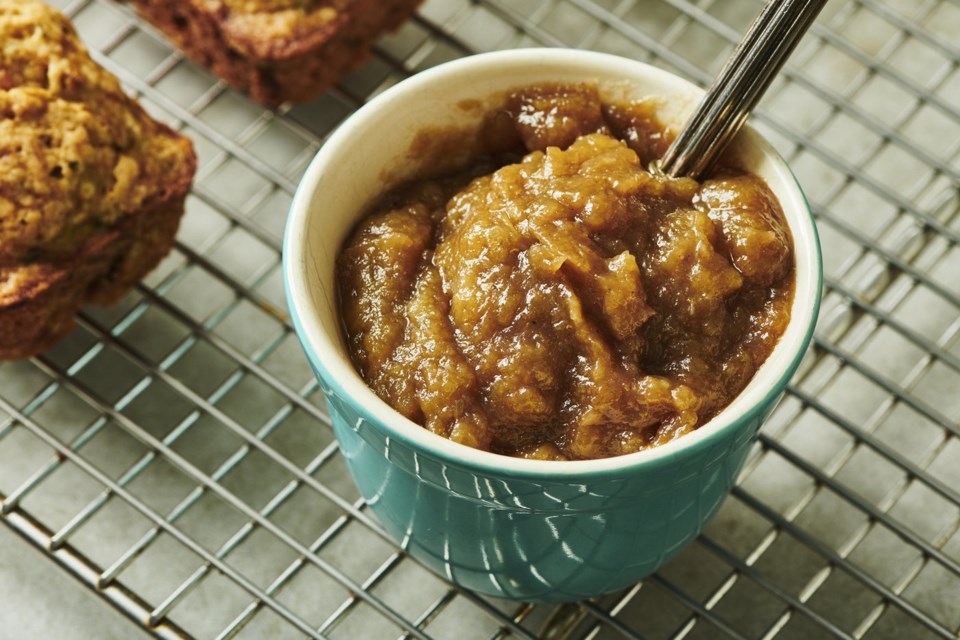For me, it’s just not fall unless there is at least one apple picking outing. It’s been a family tradition since I was little — even though I actually fell out of an apple tree and broke my leg when I was 5. It wasn’t the tree’s fault.
And we never bring home a normal amount of apples — by normal, I mean the amount a family could eat before they start to soften. The baking would ensue: apples pies with streusel toppings, apple crisps with poofs of homemade whipped cream, apple coffee cakes, apple muffins.
But lately, I’ve been craving apple butter, a concentrated puree of autumn’s favorite fruit (mine, anyhow). Contrary to what the name suggests, there is no butter in apple butter. The name refers to the fact that this slow-cooked, thick, sweetened-and-spiced apple spread can be swiped across toast, muffins, etc., in place of butter.
The main difference between apple sauce and apple butter is the thickness. Apple butter is cooked for longer and reduces down to a thicker consistency.
Apple butter has an intensely appley and sweet flavor, and also tastes of the warm spices added; in the case of the recipe below, cinnamon, cloves and allspice. If you want to skip the cloves or allspice, using either one plus the cinnamon is fine. Or, just stick with cinnamon, using 1 1/2 teaspoons of the spice for a simpler, cinnamon-flavored apple butter.
You can use any apples to make apple butter. Softer apples will cook down faster and get to that smooth texture more easily. Try McIntosh, Fuji or Yellow Delicious. The amount of sugar you want to add depends on the sweetness or tartness of the apples. I suggest starting with 1/2 cup, tasting toward the end, and then adjusting the amount of sugar and spices as desired.
There are two ways to see if your apple butter has cooked down to the desired thickness. A spoonful of the apple butter should remain mounded on the spoon, and not slowly drip off. Or, place the spoonful of apple butter on a plate, and liquid should not seep out from around the edges.
Apple butter is delicious on bread and toast of all kinds. Pumpkin bread or zucchini bread are also great options, underscoring the whole autumnal vibe.
You can also stir it into oatmeal, grits, or another breakfast porridge. It makes a nice filling for crepes, and can also be stirred into cottage cheese or yogurt.
Or brush it on a roast chicken for the last 15 minutes of roasting for a lovely sweet fall flavor. It's nice paired with cheeses as well; try cheddar, manchego or another firm sharp cheese.
The smooth “butter” can also be used in baking, as a replacement for oil, and adds a natural sweetness to recipes. You may want to reduce the amount of sugar called for in a recipe, since the apple butter has sugar added in.
Apple butter can be refrigerated for up to three weeks, tightly sealed. It can also be frozen for up to one year. Whether you use a container or a freezer-proof bag, make sure there is a little room for the apple butter to expand when it freezes, but not so much extra room that air will be trapped in the container. If you are canning the apple butter in a hot water bath, it can last much longer.
APPLE BUTTER
Makes 1 1/2 cups, serves 12 people
Ingredients
3 pounds apples (such as Try McIntosh, Fuji, or Yellow Delicious)
1/2 cup water
1/2 to 1 cup sugar
1 teaspoon ground cinnamon
¼ teaspoon ground cloves
¼ teaspoon ground allspice
Directions
Wash the apples, then quarter and core them.
Place the apples with the water in a large, heavy pot. Bring the apples to a simmer over medium-high heat. Reduce the heat to medium and simmer the apples, uncovered, until they are very tender and starting to fall apart, about 25 minutes (some apples will take longer than others). Stir frequently. You can add a few more tablespoons of water if needed so the apples can get fall-apart mushy without sticking to the pot or burning.
Remove from the heat and press the apples, along with any remaining liquid in the pot, through a food mill. Discard the solids periodically to make the pureeing faster.
Rinse out the pot and return the pureed apples to the pot over medium heat. Add 1/2 cup of the sugar, cinnamon, cloves and allspice. Stir frequently until the mixture has thickened and smells great, about 5 minutes. Add up to another 1/2 cup of sugar as needed to reach the desired sweetness.
Seal the jars and refrigerate for up to three weeks.
___
Katie Workman writes regularly about food for The Associated Press. She has written two cookbooks focused on family-friendly cooking, “Dinner Solved!” and “The Mom 100 Cookbook.” She blogs at http://www.themom100.com/about-katie-workman. She can be reached at Katie@themom100.com.
Katie Workman, The Associated Press



